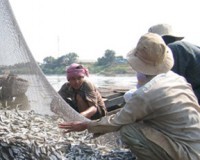
AquaFish Phase I
Sub-Sector:
Aquaculture & Fisheries
Status: Historic
|
Start – End Date:
2006 – 2013/03/31

Regions:
Asia, Global, Latin America and the Caribbean, Middle East, Sub-Saharan Africa, US and Canada
Related Key Topics:
Capacity Building, Climate Change, Food Security, Gender, Health and Nutrition, Innovation, Markets, Natural Resource Management, Policy, Productivity
Contact
Oregon State University
418 Snell Hall
Corvallis, Oregon 97331
TEL: +1-541-737-6426
Contact Form
Dr. Hillary Egna,
Director
egnah@onid.orst.edu
The Aquaculture and Fisheries (AquaFish) CRSP Phase I strived to improve the livelihoods of small holders along the aquatic resources value chain through international, multidisciplinary partnerships that advance science, research, education, and outreach. During phase 1, the program was active in 16 countries in Africa, Asia, and Latin America and has linkages with over 200 collaborating institutions and organizations. The AquaFish CRSP is a recognized leader in training small holders in improved fisheries management and aquaculture production.
Working with local stakeholders along the value-chain, the program supported a variety of activities including on-farm and demonstration aquaculture trials, community management of fisheries, value-added processing, and group marketing.
Research investigations developed new technologies, management practices and aquatic products. The program was highly successful in working with women’s producers and community organizations to improve pond production and fisheries management, open new income opportunities in production, marketing, and processing, and ensure food safety and food security.
One of the AquaFish CRSP’s primary goals was to strengthen human and institutional capacities both in partner host country institutions and in the US. The program supported degree training for students from around the world and leveraged significant training support from external sources. The AquaFish CRSP targets a 50:50 ratio of males to females in its long-term training goals.
The AquaFish CRSP aligned its objectives with the US government’s Global Hunger and Food Security Initiative — Feed the Future. The United States Agency for International Development (USAID) looked to the AquaFish CRSP to “develop more comprehensive, sustainable, ecological and socially compatible, and economically viable aquaculture systems and innovative fisheries management systems in developing countries that contribute to poverty alleviation and food security.”
Under the leadership of Program Director, Dr. Hillary Egna, the program was managed by Oregon State University. The projects included 17 US universities and 31 host country institutions in formally funded partnerships.
